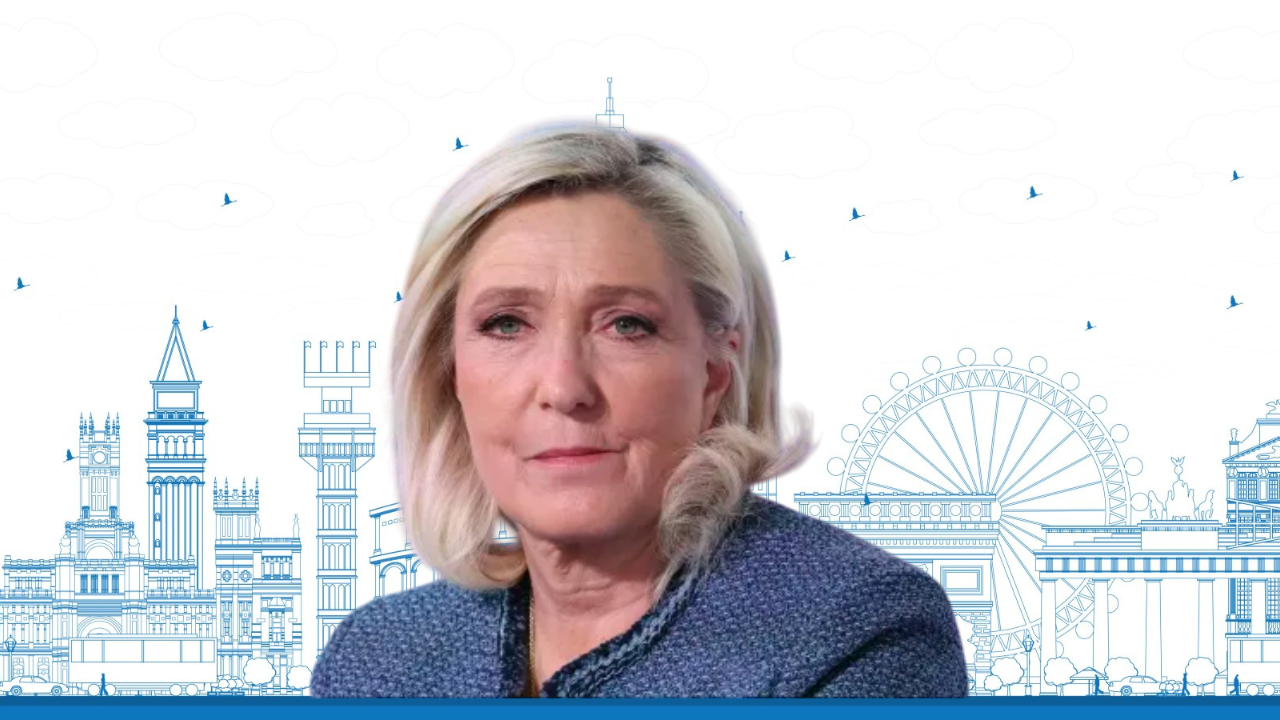In the Name of the French People: The European Consequences of Marine Le Pen’s Conviction
By supporting Marine Le Pen, members of the international nationalist coalition have put partisan solidarity before defending the interests of national taxpayers. A commentary by Sylvie Goulard

Marine Le Pen’s conviction for misappropriation of EU public funds, coupled with a ban from being a candidate at future elections, invites us to ask what democracy truly is: Is it primarily about elections, with universal suffrage granting elected officials a form of immunity, regardless of their actions? Or should the law be “the same for everyone,” thereby placing voting in a broader perspective?
The concept of the “rule of law” provides a very clear answer to these questions: Elections are held within a legal framework that both elected representatives and institutions must respect.
The French Constitution guarantees the existence of an independent judiciary just as it protects elections. By administering justice “in the name of the French people,” the judges merely applied the law: the offense of misappropriating public funds as well as the imposed penalties—including her ineligibility —are stipulated in the criminal code. Thus, far from conflicting, the legislative and judicial functions complement each other, forming a balance of powers.
There is no “political decision”
Marine Le Pen claims she has been the victim of a “political” decision but offers little to substantiate this charge. She enjoyed all the rights guaranteed to defendants, as provided in France by the Constitution, in particular the 1789 Declaration of human and civic rights: the presumption of innocence; the definition by law of the offenses; the right to defense; an investigation conducted both “à charge et à décharge” (i.e in a neutral way) by independent examining magistrates; and the involvement of the Public Prosecutor’s Office—whose role is to uphold public order and which does not receive instructions in individual cases.
No judicial system is perfect. However, the French one does not deserve the attacks it has faced in the last few days. Democracy gains nothing from such excesses.
It is true that the decision of the Paris Criminal Court carries serious consequences, but the fines and prison sentences imposed are well below the legal maximums, though the case is serious. Moreover, the judgment reveals that Ms. Le Pen, herself a trained lawyer, chose a defense strategy of disregarding the European Parliament’s rules. She also looked down on the court.
Contrary to what the Rassemblement National leader states, she is not being singled out, as other political parties have also been convicted for misusing EU assistance funds, including that of the current Prime Minister, François Bayrou. While he personally escaped conviction at the first instance “due to insufficient evidence,” the party he chairs, MoDem (as a legal entity), was condemned along with around ten former MEPs and staffers. The Prosecutor’s Office has appealed his acquittal.
Having been questioned and indicted myself in this case, before ultimately obtaining a full and final dismissal without being referred to trial, I can attest that the investigating judges carry out their work without leniency. It never crossed my mind to invoke my political mandate to evade their questions, no matter how pressing they were. On the contrary, in June 2017, I even chose to leave the French government—despite having done nothing wrong—out of respect for our armed forces and for the citizens.
If we want to build confidence in the political class, some efforts seem necessary to fill the gap between speeches and behaviours. Some years ago, Ms Le Pen was in favour of life-long ban from politics for politicians misusing public funds, or being corrupted.
Concerning Marine Le Pen and the Rassemblement National, after years of investigation, the court ruled that the misappropriation of European public funds was established, including the fact for example, that her bodyguard or her fathers’s butler were remunerated as “parliamentary assistants”.
A 152-page decision sets out the details.
It is striking that the debate focuses more on her disqualification from office than on the actual facts, as though it were inconsequential for a presidential candidate to have diverted EU funds. The judges pointed out that political figures have a duty of integrity. Should we contradict them? The popularity of a politician among part of the electorate - her argument - cannot justify the misuse of all taxpayers’ money.
In defense of the European taxpayers
In this case, since the misappropriation involved the European Parliament, the French judge was, more broadly, defending the interests of European taxpayers. Stating, as Ms Le Pen does, that citizens should be able to judge “politically” at the next presidential election overlooks the fact that a majority of the taxpayers who were wronged will not take part in the 2027 vote simply because they are not French.
By supporting Marine Le Pen, the members of the nationalist international (such as Viktor Orban, Matteo Salvini, or Geert Wilders) have placed partisan solidarity before the interests of national taxpayers of their countries. They seem to wish at any price that the next representative of France to the European Council should be someone convicted of misappropriation of funds.
The rule of law allows for appeals, and there is no doubt that Marine Le Pen, her party, and those who were convicted alongside her will make use of that right. She already mentioned that she would even go to the European Court of Human Rights at the supranational level, which is quite interesting for someone in favour of withdrawing from the convention on human rights.
The presidential election is scheduled for 2027. This gives her, if circumstances permit, time to prove her innocence and, should she be exonerated, to stand before the voters.
The strategy chosen by the President of the RN—refusing to accept any wrongdoing, casting herself as a victim, and insulting the justice system—may turn out not to be a winning one. Yet it will be up to the Court of Appeal to decide, in full independence.
What is at stake in France, in the Le Pen case, goes beyond the French borders and the French presidential elections. It is about European values and our vision of the rule of Law, as well as the way we protect the EU budget from misappropriation.
One of the main concerns is that part of the French privately-owned media are echoing her brutal attacks against the French justice and the disinformation spreading from Russia and from the US. It is time to open our eyes to the hybrid war we are the target of.
IEP@BU does not express opinions of its own. The opinions expressed in this publication are those of the authors. Any errors or omissions are the responsibility of the authors.
